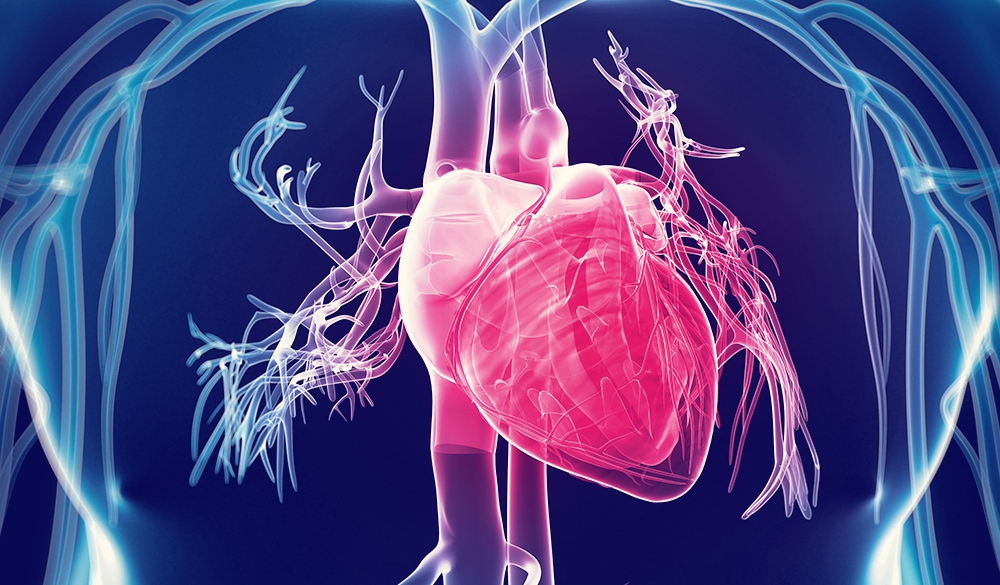Homocysteine is a sulphur-containing amino acid exclusively produced by the demethylation of methionine.[1,2]
Elevated circulating homocysteine (tHcy) levels (hyperhomocysteinaemia) plays an important role in the development of ischaemic heart disease and stroke – the two leading causes of death worldwide.[1,3,4] Hypertension has been identified as the most important risk factor for stroke and current data shows that elevated homocysteine levels are associated with hypertension and play a significant role in the condition’s aetiology.[1]
Hyperhomocysteinaemia’s role in cardiovascular disease (CVD) is understood to be related to the associated endothelial cell damage, reduction in the flexibility of vessels and alterations in haemostatic processes that leads to the development of conditions such as atherosclerosis, arteriosclerosis, venous thrombosis, peripheral arterial disease, pulmonary embolism and hypertension.[3,5] It may also enhance the adverse effects of CVD risk factors including hypertension, smoking, lipid and lipoprotein metabolism, as well as promoting the development of inflammation.[3]
Hyperhomocysteinaemia may arise from genetic defects of several enzymes involved in homocysteine metabolism including methylenetetrahydrofolate reductase (MTHFR), methionine synthase (MTR) and cystathionine-beta-synthase (CBS).[3]
Polymorphisms of the MTHFR gene are the most studied determinants of blood homocysteine levels,[1-3] while the most common genetic cause of severe hyperhomocysteinaemia is believed to be the deficiency of CBS, which has been shown to result in a 40-fold increase in fasting tHcy.[3] Other causes include the deficiency or impaired activity of MTR due to genetic disorders of vitamin B12 metabolism.[3]
MTHFR and MTR are the main regulatory enzymes associated with homocysteine metabolism, with polymorphisms of these genes leading to reduced enzymatic activity; displaying increased tHcy and reduced methionine levels in states of sub-optimal folate.[1] The polymorphism of the MTHFR gene where cytosine is replaced by thymine at base 677 (known as C677T) has shown to result in a 20% increase of basal plasma tHcy.[6] Outside of these genetic mutations folate and vitamins B6 and B12 are essential cofactors in the methylation cycle and homocysteine-methionine metabolism, and low bioavailability and function of these nutrients due to the polymorphisms impair the remethylation of homocysteine to methionine, lending to a vicious cycle of compounding tHcy levels.[3]
Certain nutritional and lifestyle components also play a role in the pathophysiology of hyperhomocysteinaemia. Deficiencies of folate, vitamins B6 and B12 due to poor nutrient intake, malabsorption, medications or the presence of certain diseases may lead to abnormal homocysteine concentrations. Vegetarians may be at a higher risk of hyperhomocysteinaemia due to insufficient vitamin B12 intake.[3] While insufficient physical activity and excessive alcohol consumption have also been shown to contribute to hyperhomocysteinaemia.[3]
Management can be supported by adequate intake of bioavailable vitamins B6, B9 and B12 (particularly in the presence of MTHFR and MTR polymorphisms) as well as eliminating smoking, reducing alcohol intake and increasing levels of exercise and physical activity.[3]
References:
- Zhao M, Wang X, He M, et al. Homocysteine and stroke risk: modifying effect of methylenetetrahydrofolate reductase C677T polymorphism and folic acid intervention. Stroke 2017;48(5):1183-1190. [Abstract]
- Baggott JE, Tamura T. Homocysteine, iron and cardiovascular disease: a hypothesis. Nutrients 2015;7(2):1108-1118. [Full Text]
- Ganguly P, Alam SF. Role of homocysteine in the development of cardiovascular disease. Nutr J 2015;14:6. [Full Text]
- World Health Organization (WHO). The top 10 causes of death. WHO [online] 2017. [Source]
- Moll S, Varga EA. Homocysteine and MTHFR mutations. Circulation 2015;132(1):e6-e9. [Full Text]
- Ford AH, Flicker L, Hankey GJ, et al. Homocysteine, methylenetetrahydrofolate reductase C677T polymorphism and cognitive impairment: the health in men study Mol Psychiatry 2012;17(5):559-566. [Full Text]
DISCLAIMER:
The information provided on FX Medicine is for educational and informational purposes only. The information provided on this site is not, nor is it intended to be, a substitute for professional advice or care. Please seek the advice of a qualified health care professional in the event something you have read here raises questions or concerns regarding your health.



